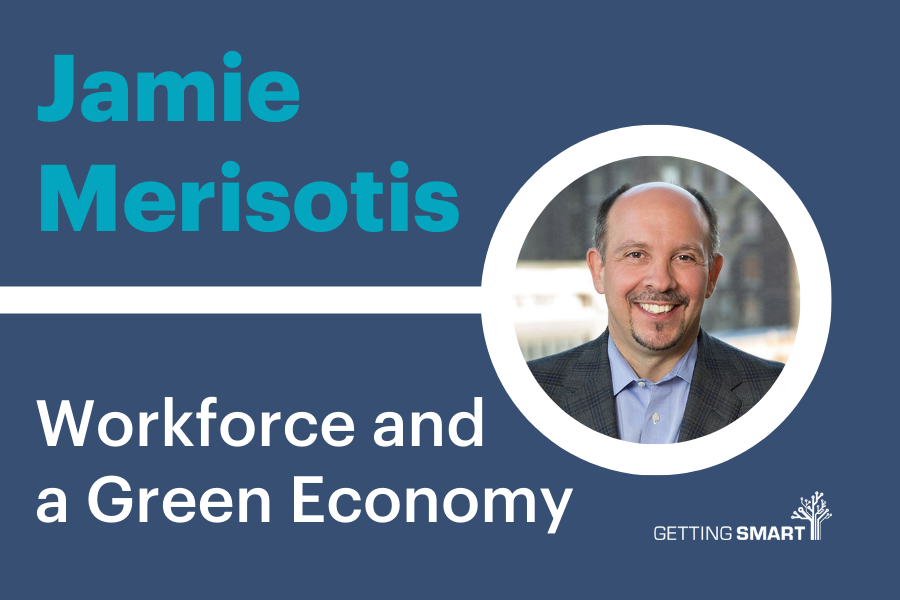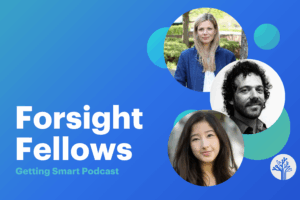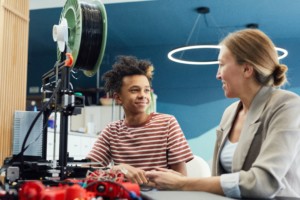Jamie Merisotis on Preparing the Workforce for a Green and New Economy
Key Points
-
New technology disrupts the job market, but creates new jobs in its wake.
-
It will be tasks within jobs that are automated rather than full jobs.
-
The threat of a barbell economy must drive the lifelong learning agenda forward.

This episode of the Getting Smart Podcast is brought to you by our recent publication Green Pathways, and makes the case for why ALL pathways need sustainability and green embedded. Find out more here.
On this episode of the Getting Smart Podcast, Tom Vander Ark is joined by repeat guest Jamie Merisotis, CEO of Lumina Foundation, a foundation committed to making opportunities for learning beyond high school available to all. We spoke with Jamie in 2020 right after the publication of Human Work in the Age of Smart Machines.
Transform and change yourselves, but make the case for what you’re doing and why it matters.
Jamie Merisotis
Transcript
Tom Vander Ark: The climate crisis and the rise of artificial intelligence are the two most important change forces that will shape the lives and livelihoods of young people today. They have some things in common—they’re both accelerating change, disruptive to traditional patterns of life and learning, reshuffling the employment landscape, and reprioritizing skill requirements. As our guest Jamie Merisotis will describe, they’re emphasizing human skills as well as prioritizing new technical skills. The green economy, particularly the electrification of everything and the integration of smart tools into every aspect of life and work, represents two giant entrepreneurial opportunities. The next twenty years will see an enormous start-up of both for-profit and nonprofit organizations that will be an important part of the change process. To discuss all of this, we have a repeat guest, Jamie Merisotis, the President of the Lumina Foundation. Jamie, it’s great to have you back on the Getting Smart podcast.
Jamie Merisotis: Thanks very much, Tom. It’s great to be with you.
Tom Vander Ark: Jamie, in 2020, you published a really important book called Human Work in the Age of Smart Machines. Your thesis was that machine intelligence is coming fast, changing the workforce, and as a result, we have to get better at human skills. A lot of us appreciated the warning you gave—sort of just in time right before the explosion of generative AI. How do you think about what’s happened since you wrote the book? What would you get right, and what would you emphasize now?
Jamie Merisotis: It’s been an interesting time, as you said. 2023 was a breakthrough moment when ChatGPT pierced the public’s consciousness, making it clear that AI isn’t some future-oriented, long-term science fiction notion; it’s here, it’s real, it’s happening now. When I was working on the book on human work, we saw the development of these large language models and what would happen with generative AI. Seeing it come through has been valuable. There have been two reactions that tie into the human work theme. One has been the panic over the fact that generative AI will lead to job loss. It’s a common reaction to technological change because job loss is often a fear, partly because there’s some truth to it. Job loss does happen with technological change, but as I said in the book, job creation often follows job loss, and in the end, more jobs are created than destroyed. The issue is that we don’t know what those jobs are when current jobs are being eliminated, which makes it seem uncertain. I still think that’s where we are now.
The second reaction is that we’re now more serious as a society about thinking of human skills as complementary to what machines can do. We’re starting to recognize the importance of human empathy, compassion, ethics, and our capacity to think critically and solve problems in ways centered around our interactions with other humans, which is different from what machines do. That’s pretty exciting. I think the part I didn’t get right in the book is that I didn’t foresee that government would be so slow to react from a regulatory perspective to potential threats. I’m someone who believes that AI will mostly serve good, but there are risks, and government has been surprisingly flat-footed on this question. We need a regulatory framework, as we do in almost any area where we want to manage risk in a way that doesn’t harm humans. I’m a believer in markets, but I also believe that smart, consumer-oriented regulation is a good thing. I’m surprised we haven’t seen more of that come into focus because what we’re currently seeing around generative AI models is just a tiny sliver of what’s coming in the near future.
Tom Vander Ark: Jamie, in the last year, in this new age of generative AI, I’ve come to a shorthand summary of my mental model of what most work will look like. I think of it as diverse teams working on new problems using smart tools. Not every job will incorporate these elements, but an increasing number of jobs will. It’s likely that these teams will be remote, diverse geographically, ethically, and skill-wise, and they’ll often tackle adaptive problems that are unfamiliar. Increasingly, they’ll use smart tools—likely sector-specific tools, like a version of ChatGPT or Bard built on sector data. This picture values a set of human skills, such as spotting opportunities, forming teams, and managing human interactions, while viewing oneself as an augmented professional, capable of achieving more with smart machines and collaborative teams. Does that resonate with you?
Jamie Merisotis: Absolutely. In fact, the idea of diverse, interconnected teams of people with different skill levels is exactly what the work model will look like across many fields and sectors. I’ve thought about it like this: technology—say, ChatGPT as an example of a smart tool—will actually be part of the team. In other words, technology will function as a teammate, similar to how collaborative robots are part of manufacturing teams in various contexts. I know some writers worry that ChatGPT will put them out of business, but I see it as a partner in the writing process, allowing humans to accomplish things that weren’t possible before or that ChatGPT can manage more easily.
To your point, it’s not so much about jobs being eliminated but about tasks within jobs being automated. Most of us will experience that—we’ll have tasks automated, and there will be a shift in skill emphasis. We’ll probably do less creation and more editing and curation. People who are adaptive to the new opportunities of using smart tools for meaningful work will be the ones to take jobs, not AI itself. People with AI who have the ingenuity and entrepreneurial mindset to tackle new problems will be at an advantage.
Jamie Merisotis: In my book, Human Work, I outlined four categories of workers: helpers, bridgers, integrators, and creators. The group I think will be most prevalent in the workforce moving forward is the creators—those who combine technical skills with pure creativity. Technology frees us to do more human-centered tasks. Helpers engage in deep personal interactions, with less tech interface, while bridgers and integrators link technical systems with human work. Creators bring technical expertise and creativity together in ways that machines simply can’t replicate, particularly in areas involving human ethics, compassion, and other uniquely human attributes. I don’t think we’ll see compassionate, ethical machines in our lifetime, no matter how advanced technology becomes.
Tom Vander Ark: Your book also provided vivid insights into the future of learning, especially postsecondary education. Any new adjustments to your mental model of what postsecondary learning is or how it connects human beings to opportunity?
Jamie Merisotis: In the book, I included a chapter on democracy and learning, which I think surprised people. Since then, we’ve seen significant events like January 6 and a growing erosion in public belief in democracy. This includes increased interest in authoritarianism and declining trust in institutions. We need to double down on viewing the learning system as an engine of democracy. The social and economic benefits of learning are hard to achieve in nondemocratic contexts. From my experience working in countries where democracy and rule of law are absent, I know it’s not a good life for people. It’s one of fear and disconnection. Learning systems play a crucial role in reinforcing democracy, something that will be important not just for the next election but for years to come.
Tom Vander Ark: I’m concerned about the high likelihood of very convincing deepfakes and scams during the upcoming election cycle. It feels like it could become chaotic.
Jamie Merisotis: I share that concern, and I’m also worried about oversimplifying what we’re up against. The divides we’re facing aren’t just political, like Democrat vs. Republican or conservative vs. progressive. It’s becoming a divide between those who believe in democratic principles, institutions, and facts, and those who don’t. The latter group will likely leverage technology to spread chaos and create ambiguity and uncertainty about institutions and democracy. Education has a role to play here. It’s always been about transmitting knowledge and developing the ability to understand facts and democratic decision-making. This understanding fosters fairness, opportunity, and shared well-being, which are essential to democracy. As we head into this election cycle, I think these principles will be increasingly vital.
Tom Vander Ark: Civic education is clearly essential, and we need a new level of digital discernment and civic awareness. Shifting gears a bit, how are you thinking differently about pathways to quality jobs and how they might incorporate AI?
Jamie Merisotis: Hybrid learning opportunities, which have expanded during COVID, have opened up the learning system, creating more pathways for more learners. These pathways will likely blend traditional in-person learning with online and remote options. I also see more pathways developing within community colleges, public access institutions, and through direct-to-consumer platforms, like Coursera. These platforms offer self-driven learning and credentialed opportunities, which remain valuable in the labor market. Credentials still matter, but there’s a challenging narrative out there about the declining value of education, largely because of the current low unemployment rate. People might think, “I have a job, so why continue advancing my knowledge?” The issue is that many of these jobs are low-paying and may not last.
Tom Vander Ark: I worry about a “barbell economy,” where one end has people using AI and smart tools to innovate, while the other end has workers doing low-skill tasks directed by AI, often without growth potential. Do you see this growing divide as a risk?
Jamie Merisotis: Absolutely. This barbell economy, where we see increased income and wealth inequality, is concerning. On the lower end, we have jobs in the care economy—roles like social work and home health aides—that are traditionally undervalued and underpaid. Technology is likely to impact these roles, but historically, we haven’t compensated people well in these caring professions. This divide could worsen as technology advances unevenly across fields. However, I believe that, in the long term, most jobs will be complemented by technology, though this adoption will vary by sector.
Tom Vander Ark: I noticed on the Lumina website that you’ve invested in the green workforce space, which seems critical as government policy and technology changes drive growth in that sector. What are you doing to help shape a green economy that’s both sustainable and equitable?
Jamie Merisotis: The green economy is real and transformative, much like the tech economy was when it first emerged. People initially thought of tech jobs as limited to companies like Google or Microsoft, but now, nearly every job has some tech component. Similarly, most jobs in the future will have a green aspect because of the skills required, like adaptability, problem-solving, safety awareness, and critical thinking. It’s not confined to a single industry; it will impact many parts of the global economy, changing how we live and work. Addressing climate change will require skills that cut across different job categories, making green jobs pervasive rather than isolated.
Tom Vander Ark: I like how you’ve framed it as the “sustainability mindset,” similar to the entrepreneurial mindset, where everyone needs to learn sustainability and understand its impact. Certain verticals, like electrification and smart technology in HVAC and electric vehicles, will grow exponentially. How should the education system mobilize around these opportunities?
Jamie Merisotis: There’s a huge need to prepare workers for the impact of climate change on our living and working environments. For example, more heat days will change how people work indoors and outdoors, affecting everything from HVAC to insulation standards. Electric vehicles are another area with growing buy-in, accelerated by government incentives, but they’ll require changes in how we think about transportation, like where to charge vehicles, especially in urban areas like New York City. We need to rethink city infrastructure and real estate to accommodate these shifts, and it’s crucial for the education system to address these demands through upskilling and reskilling in specific green sectors.
Tom Vander Ark: You were an early leader in impact investing. In either the AI or green economy space, are you making any impact bets to drive positive change?
Jamie Merisotis: Yes, from both an endowment management perspective and direct equity investments, we’re seeing a lot of interest in AI-powered systems, particularly in improving efficiency on the education side. For instance, AI can aid in intrusive advising, helping students make better decisions to complete their courses and credentials. There’s also an increased focus on equity—both racial and economic—because demographic shifts require us to bring more historically marginalized individuals into the workforce with better training and education. The demand for talent and changing demographics intersect in a way that makes it essential to prepare people from low-income backgrounds and communities of color for the workforce. There’s been some political backlash against ESG (environmental, social, governance) investing, but I believe that will fade because the market demand for impact investments is too strong.
Tom Vander Ark: Are there any organizations you’d like to highlight that are doing a good job in the green upskilling and reskilling space?
Jamie Merisotis: Absolutely. The National Council for Workforce Education is doing excellent work in green job preparation, and there are interesting initiatives in specific areas, like Chicago and Hawaii, where reskilling efforts in the green economy are gaining traction. These are still somewhat unique, but I expect we’ll see this kind of work become much more widespread as demand grows.
Tom Vander Ark: As we wrap up, could you share some advice for educational leaders—whether in postsecondary institutions or large K-12 systems—on how they should prepare for the rise of AI and the green economy?
Jamie Merisotis: In a recent speech, I discussed the dual challenge for educational institutions: making a case for why education has never been more critical due to existential threats like climate change, authoritarianism, and transformative technology, while also transforming themselves to better deliver value. Postsecondary institutions, in particular, need to address issues of affordability and the relevance of their offerings. Leaders should not simply hunker down and wait out the critiques; they need to retool their institutions to provide more value at a lower cost.
With the political backlash against issues like racial equity, climate focus, and inclusion, educational leaders must continue to advocate for the importance of these investments and show how they contribute to shared well-being. Demonstrating tangible results in terms of higher skills, better-prepared individuals, and societal benefit is essential. The leaders who embrace both transformation and advocacy will be the ones to move the sector forward.
Tom Vander Ark: Great advice, Jamie. You emphasized the importance of connecting with the community, reshaping agreements about key outcomes, and reasserting your value proposition, especially around human-centered outcomes. These are truly interesting and challenging times for educational leaders.
Jamie Merisotis: Absolutely. There’s no shortage of work to be done, that’s for sure.
Tom Vander Ark: Jamie, thank you for joining us and for the work you and Lumina do to support postsecondary institutions and expand opportunities for all learners. We’re grateful for your contributions.
Jamie Merisotis: Thanks for having me, Tom, and thank you for all you do to advance thinking in this field. I really appreciate it.
Tom Vander Ark: We’ll have you back in a couple of years to see how things have shaken out. Thanks to Mason Pasha, our producer, and the entire Getting Smart team for making this possible. Until next week, keep learning, keep leading, and keep innovating for equity.
Jamie Merisotis: Sounds good. See you next time.
Links:







0 Comments
Leave a Comment
Your email address will not be published. All fields are required.